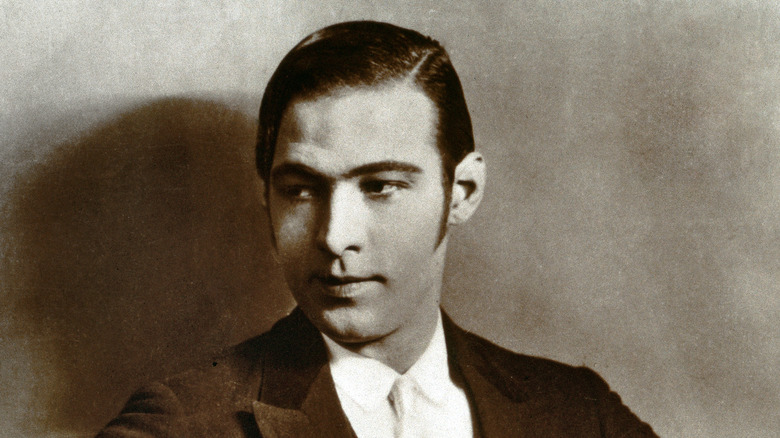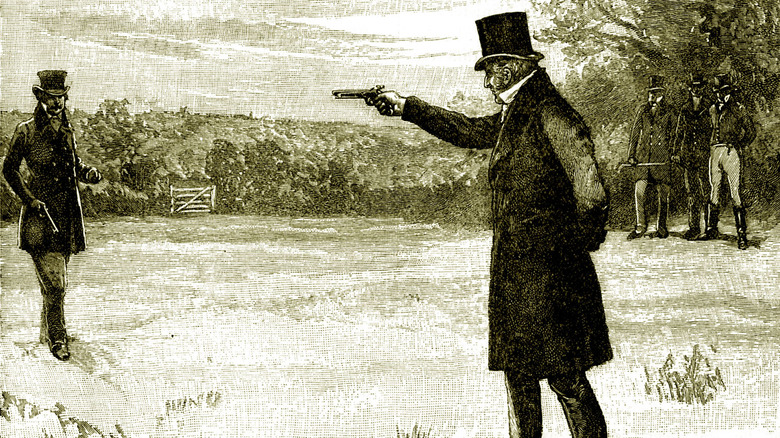Rudolph Valentino's Lone Boxing Match Occurred In Order To Defend His Honor
These days, people are expected to solve their disputes not with violence, but with words. Of course, younger children generally take a while to get the memo; look no further than your nearest school playground, and you might see a few duking it out. Adults don't always get the memo, either, although in 2022 America, for a person to settle a score with another person with violence, the result is likely going to be one or more criminal charges.
Of course, a few generations ago were decidedly different. Look no further than New Orleans, which, to this day, is home to a centuries-old living tree known as the Dueling Oak. As New Orleans Historical reports, for a time the tree was the scene of almost-daily duels, as people shot at each other over perceived (and sometimes real) slights. And as PBS reports, though many jurisdictions outlawed dueling, it went on, eventually dying out after the Civil War.
Famed silent film actor Rudolph Valentino, above, also failed to get the memo. He, too, participated in a duel (of a sort) after believing that his honor had been impugned, according to Norman Studios. However, rather than meeting at an oak tree and firing a pistol at his adversary, the actor donned gloves and took on his opponent in the boxing ring.
The Importance of Honor
Defining an abstract philosophical concept — and one that's largely been out of favor for a century — is going to be difficult at best, but nevertheless, we'll give it the old college try. As Psychology Today reports, these days human behavior — both societal and individual — is governed largely by two concepts working in concert with one another. One is the rule of law; if one person commits any of several hundred certain acts against another, they will face criminal prosecution. Indeed, that desire to avoid criminal prosecution may even inform our decisions not to resort to our baser instincts (such as throwing fisticuffs when we're wronged). The other concept is "conscience," which is hard to define in words; think of the #MeToo movement as an example of societal conscience writ large — when word of the actions of a few powerful men with regard to criminal sexual behavior toward subordinates got out, it led to a nationwide examination of those behaviors.
Prior to the modern era, however, society and individuals were largely driven by the concept of honor. Commit a crime, and not only would you pay a criminal penalty, but your honor would also be impugned, and you'd become a social pariah. Fail to live up to a contract, carry out an unfair business deal, or break a promise, and your honor would be in question. And in this context, in some cases, to write unflatteringly of an individual in a newspaper or pamphlet could be seen as an act of impugning their honor.
Rudolph Valentino Throws Down
As mentioned previously, by Rudolph Valentino's day (viz, the 1920s), dueling had been out of fashion for over half a century. However, that didn't stop the silent film actor from challenging a foe to a duel. Specifically, as Norman Studios reports, men not named Rudolph Valentino were concerned about the effect the star was having on American men vis a vis the concepts of masculinity as it was understood at the time. The actor largely publicly brooked such slights while privately seething, but when a Chicago Tribune columnist called his masculinity into question, he'd had enough. "To the man (?) who wrote the editorial headed 'Pink Powder Puffs' in Sunday's Tribune, I call you in return, a contemptible coward and to prove which of us is a better man, challenge you to a personal test," he wrote.
Specifically, Valentino challenged his adversary to a boxing match. Dueling with pistols was out of the question, and Valentino had taken boxing lessons, so (to him anyway) it seemed as good a way as any to settle the score. The original writer declined the invitation, but local sportswriter Frank O'Neil accepted the challenge. O'Neil managed to land a single punch before Valentino flattened him; ever the gentleman, Valentino helped his adversary to his feet and apologized.
That didn't put an end to writers dissing Valentino and his masculinity, and Valentino being salty about it. However, he died a year later of pleuritis at the age of 31.


